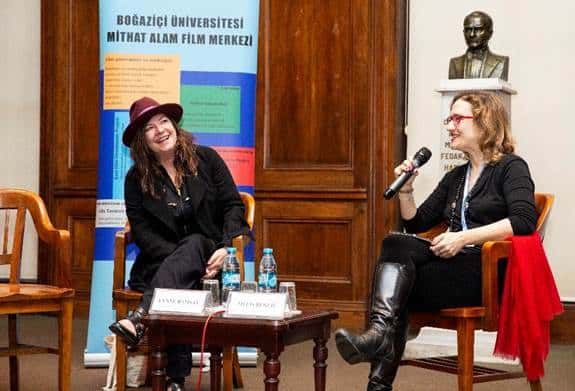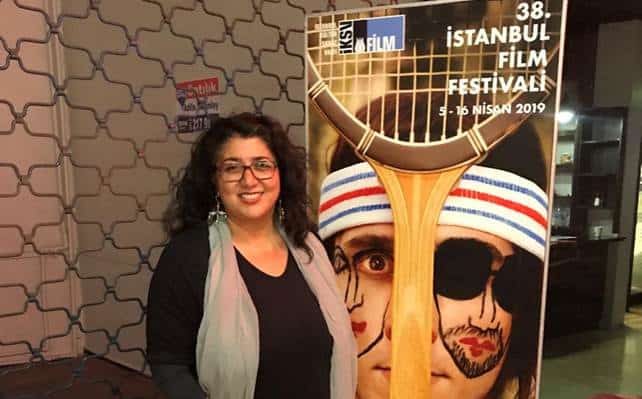Festival Talk with Lynne Ramsay
The Festival is proud to host esteemed filmmaker Lynne Ramsay as the president of this year’s International Competition Jury. A festival talk with the director took place at the Boğaziçi University campus moderated by Melis Behlil.
Ramsay, who received the Best Screenplay Award at Cannes for her latest film You Were Never Really Here, said that a filmmaker’s job is to ask and discuss tough questions that could be considered dark by others. She added that her characters never progress through a straight line and that’s the type of character she is interested in. About her last three films which were all literary adaptations Ramsay said: “Most bestsellers don’t make good films because film is a different experience. When I was writing We Need to Talk About Kevin I had to rethink the whole book. That process taught me a lot about editing. You have to have a certain instinct to be able to turn a book into a film. Images appear inside my head, I don’t go through analyzing that much. Before each film, I put together a book that consists of these images that appear to me.”

Ramsay said that she doesn’t watch the news and isn’t on social media, instead she gets world news from documentaries and added that she wants to make a documentary if she can find a subject matter she can believe in and dedicate herself to for a long period. Ramsay reminded the students who attend the event that university years are very formative for a person and gave this advice to those who want to make films: “Create things with your friends. Film making is very hard, so people you work with become like a family. Don’t lose people you love and work with. Like Jane Campion says “play”, like a child. These days, there are so many rules about how a job can be done, so many boxes to check. However, there’s no formula for this job. None of us know what the end result will be when we start a film. So, be brave and play.”
For the events calendar click here.
First film about Vietnam in French cinema
Competing at the International Competition, To the Ends of the World is about a French soldier on a revenge mission following the Vietminh attack in Indochina in 1945. Noted for his technical mastery, director Guillaume Nicloux had his film’s premiere at the Directors’ Fortnight section of Cannes. Joined by actor Gaspard Ulliel, Nicloux answered audience questions after the screening at Cinemaximum City’s Nişantaşı.
When asked why he made a film about Vietnam and Indochina, Nicloux said: “Vietnam – Indochina is a story in the distance past for me and for my children. The things that happened in those days are like a dream for us. People mostly know about the Vietnam War. It’s more talked about with the participation of the United States. The Indochina side of the war is less talked about even though French soldiers fought there. So, it’s lesser known.”
This is Nicloux’s third film working with Gérard Depardieu: “We finished a fourth film with Depardieu. He is an actor with a great career; he’s made so many films. He is an actor who says I don’t want to make films, but nonetheless can’t do without them. Despite that, we made our fourth film together.”
Gaspard Ulliel talked about how he got into the psychology of war. “Working with Guillaume is a different experience. He doesn’t want to share that much before the film. He wants to catch us off guard and experience everything right there in the moment when we film. As actors, we found out about the location and daily schedule minutes before shooting.”
For further information about the film click here.
The story of Nigerian sex workers
Joy, tells the story of a Nigerian sex worker of the same name. Notable for featuring strong scenes of physical and sexual violence, the film brings to the silver screen the merciless exploitation that immigrant sex workers go through. Director Sudabeh Mortezai answered audience questions after the screening which took place at Beyoğlu Film Theatre.

You didn’t show violence directly in the film. The world you show in the film is a tough environment. What was your research process like for the film?
During the planning process, I knew that I didn’t want to objectify women; I didn’t want to show them in that way, getting raped and subjected to violence. Many films about this subject start with good intentions, but they end up exposing women turning them into objects. I didn’t want to do that. The research process was difficult in the beginning, but I gained their trust. I started with Nigerian circles in Austria and continued with Nigerian women in Italy. Italy is the first destination where Nigerian sex workers arrive at. Then I went southern Nigeria to the place where they are brought together to be sent to Europe as sex workers.
Did the film open in Nigeria? What were the reactions there?
The film didn’t open in Nigeria, yet. It’s not easy to open the film there because there aren’t many film theatres in Nigeria. I don’t think showing it at just one film theatre in Lagos would serve the purpose of the film. I wish it was shown in the regions where the women come from but we don’t have that chance. But Netflix purchased the film. And the Netflix representative who decided to buy the film is a Nigerian woman. She wants to screen the film in Nigeria.
For further information about the film click here.
Krikris’ first film: The Waiter
Seven years in the making The Waiter is the first film of director, stage actor, screenwriter, advertiser, and festival planner Steve Krikris. 40-something introverted waiter Renos’ quiet and meticulously punctual routine life is turned upside down by the sudden disappearance of his neighbor. Following the screening at Cinemaximum City’s Nişantaşı Steve Krikris answered audience questions.
You’ve previously starred in several Yorgos Lanthimos films. Do you consider yourself as a member of the Greek New Wave?
Yorgos and I go way back. Because of budget constraints he used to include his acquaintances in his films. I starred in two of his films. His films are different than other Greek films, like Angelopoulos’ for example. We can say that budget constraints led him to be creative. However, we’re neither similar nor influenced by each other. The only thing we have in common is actor Aris Servetalis who starred in both of us’ films.
There’s tension and evil in the film, but it’s not about either of them.
If I have to categorise the film, I would say it’s a neo-noir.
What was the idea behind the film?
I used to live in a four-story building in the East Village in New York at the end of the ’80s. I had a Czech neighbor. He was murdered and I saw the culprit. I was very affected by it. Years later, we were asked to come up with a premise in a screenwriting workshop. I thought about that incident and decided to turn it into a script. The idea sparked in that workshop.
For further information about the film click here.
A story of a father at the Turkish border: Dear Son
Dear Son, is the second feature-length of Tunisian director Mohamed Ben Attia who had a breakthrough with his debut Hedi. The film, which is screened in the Young Masters section of the Festival, had its premiere at the Directors’’ Fortnight section of Cannes. Inspired by real events, the film tells the story of a father who searches for his son after he runs away from home to join ISIS. Mohamed Ben Attia answered audience questions following the screening.

Lately, we’ve seen a lot of films about the Middle East and Northern Africa with similar themes. Is this because of what goes on in those societies or are they just stories?
First off, I wrote this story. So, yes, this was a story. However, about whether this is something that happens in a society… All of this needed to be adapted to a film and told in a cinematic language. We attended many festivals and witnessed that this is a problem in a lot of countries. No matter which country we live in, we talk about and question our existence. As we go through the same problems, when I look at it from Tunisians’ perspective I see that everyone has expectations. You can be a very ordinary family. That’s what I depicted in the film. The issue in the film is more ideological than economic or religious. People can have a job or a family, but you can’t ignore what comes from deep inside.
For further information about the film click here.
Eels and women: The Miracle of the Sargasso Sea
Featuring Biblical references, a Lynch-ian psychological drama and unique visual language, Syllas Tzoumerkas’ third feature The Miracle of the Sargasso Sea screened in the Mined Zone section of the Festival. Following the screening Syllas Tzoumerkas answered audience questions.
What is the connection between eels and Rita in the film?
The whole story came from eels, because they take on a very dangerous journey from the Aegean to the Atlantic Ocean and they go through an amazing transformation during the process. So, we wanted to somehow reflect them on the two female characters. Rita was suitable for this, because she is the closest to the transformation and journey of these creatures that are like dinosaurs. Elizavet also transforms in the film, but hers is different.
In the dream sequence, 3 oddly dressed characters visited the couple. Was their story significant?
What you saw in that scene was Jesus, Mary and the three kings. It actually represents the birth of Jesus. We wanted to create a dream world full of both heavenly and hellish images. My favourite scenes in the film are that one and the resurrection of Jesus.
Is loneliness and ill-communication more severe in a corner of the countryside than in Athens?
I grew up in a village. I’m a villager. So, I know both the village and city life very well. What these two women have in common is that they both know that they won’t be happy wherever they are and they are overwhelmed by the patriarchal system. They are fighting to reclaim their honor, identity and personality.
The city looks both like a marvel of nature and a prison. The characters also seem likeable in one minute and despicable the next. Did you go for this contrast in order to dig deeper into the story?
All characters in the film are a shade of grey. One minute they seem very dark, soulless, and bad, but then you see a sparkle. I love this sense of loose and unbalanced ground that the film offers through the characters. On the other hand, whenever these characters feel a joy of life they also feel the pain that comes with it.
For further information about the film click here.
The screenings of films in the National Competition and National Documentary Competition sections started
The screening of the National Competition film Brothers, which also competes for the Seyfi Teoman First Film Award, took place at the Atlas Film Theatre attended by director Ömür Atay and the film’s crew. The film tells the story of two brothers who are condemned to one another’s destiny.
In the National Documentary Competition two films were screened at the Pera Museum Auditorium yesterday. Noted for its lyrical narrative Come Rain or Shine screened with director Zeynep Güzel and the film’s crew in attendance, and director Rena Luisn Bitmez and the film’s crew was in attendance at the screening of Do You Think God Loves Immigrant Kids, Mom?, which was eight years in the making and chronicles the struggle of Armenian families who immigrated to Istanbul and their efforts to have education for their children.
For further details about the National and International Competition films click here.
Yesterday at Meetings of the Bridge:
Gender inequality in the film industry: What now?
Gender inequality in the film and other industries was discussed at a panel during Meetings at the Bridge attended by Füsun Erikssen (Consultant / Danish Culture Institute), Mette-Ann Schepelern (Director), Seçil Seyfe (Marketing Manager / Dell), Delphyne Besse (Producer / Urban Group), Ana Souza (Festival Programmer / Sundance Film Festival), Ege Ortaçgil (Psychologist / Porta Eğitim), Karin Chien (Producer, Distributor / dGenerate Films), Rebecca Green (Producer / Dear Producer), Claudette Godfrey (Program Executive/ SXSW), Helene Granqvist (Producer/ Nordic Factory Film), and Cihan Aslı Filiz’in (Producer / Bir Film).

The participants shared anecdotes from their own sectors and exchanged ideas how to combat the issue. The participants offered suggestions on how to find a solution and create awareness and talked about an international women’s network.
Dogs of Berlin
Writer/director Christian Alvart, producer Sigi Kamml, and actor Felix Kramer from Dogs of Berlin were guests of Meetings at the Bridge. The participants talked about the production story of the series which reveals Berlin’s multilayered underworld during the panel moderated by film writer Sezen Sayınalp.
Learning from extraordinary mistakes
Katriel Schory, the chief of Israel Film Fund, and producer Diana Elbaum discussed common production mistakes and how they can be turned into useful knowledge at Meetings at the Bridge.
For the events list of Meetings on the Bridge click here.
Daily Film Selection:
In Safe Hands | 19.00 | Rexx movie theatre
Dragged Across Concrete | 21.30 | Atlas and Rexx movie theatres
Daily Documentary Selection:
Circus Rwanda | 13.30 | Cinemaximum City’s Nişantaşı
Heroes | 21.30 | Pera Museum Auditorium
Festival in Photos
See daily photos from the festival at http://www.iksvphoto.com/#/folder/aa602o and on our Instagram account.
Images courtesy of IKSV.









